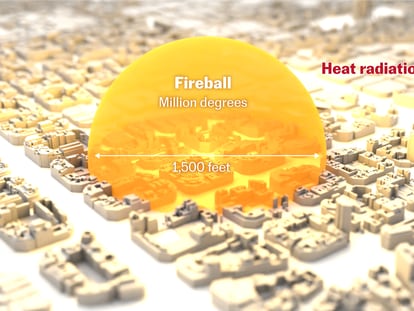Russia open to US nuclear talks but Biden-Putin summit ‘out of the question’
Moscow confirmed a meeting with Washington in Cairo in late November to discuss atomic weapons, but the Ukraine war will not be on the agenda
/cloudfront-eu-central-1.images.arcpublishing.com/prisa/TIQM3HREMOHXWXB2ABV75K6PCI.jpg)

Moscow and Washington are showing increasing willingness to talk. Despite the ongoing war in Ukraine, Russia and the US remain open to dialogue on the subject of their common interests, from the granting of visas to nuclear disarmament. Now, the Kremlin has opened the door to high-level meetings to discuss the two nations’ nuclear arsenals: “If the Americans show interest and readiness, we will not refuse,” Russian Deputy Foreign Minister Sergei Ryabkov said on Friday.
Moscow has announced that the consultative commission of the New START (Strategic Arms Reduction Treaty) will meet in Cairo between November 29 and December 6. It will represent the first meeting in a year to discuss the only standing agreement between the two superpowers regarding their nuclear arsenals.
The New START treaty was signed in April 2010 by the presidents of the US and Russia at the time, Barack Obama and Dmitry Medvedev. The agreement establishes the maximum number of nuclear platforms and warheads the two countries can have and regulates the conditions for carrying out mutual inspections. Moscow has accused Washington of leaving some of its missiles out of the treaty by reclassifying them while the US wants to carry out an inspection in Russia, something that Ryabkov dismissed as a “whim” last summer.
Ryabkov has left the initiative in the hands of the Americans, whom he accused of putting the stoppers on discussions after mutual inspections were halted in 2020 due to the Covid-19 pandemic. Russia ceased cooperation with inspections in August, with Moscow citing travel restrictions imposed as a consequence of the Kremlin’s invasion of Ukraine. “It is simple logic,” Ryabkov was quoted as saying. “They interrupted it, they must resume it.”
However, the Deputy Foreign Minister was adamant there would be no discussion of the ongoing war in Cairo: “There can simply be no dialogue, let alone negotiations, given the radical opposing positions.” Kremlin spokesman Dmitry Peskov and ruled out any possibility of a meeting between Biden and Russian President Vladimir Putin. “A summit is out of the question at the moment”
Steps toward de-escalation
Despite Putin’s veiled threats over the possible use of nuclear weapons in the Ukraine war, the Kremlin and the White House have taken steps to prevent an escalation of the conflict. On November 14, CIA director William Burns met with the head of the Russian Foreign Intelligence Service, Sergey Naryshkin in Turkey. According to a White House spokesman, Burns issued his counterpart a warning over the consequences deploying using weapons of mass destruction in Ukraine.
Both Kyiv and Moscow have accused each other of putting the Zaporizhzhia nuclear power plant, Europe’s largest, at risk. Under the control of Russian troops since the early stages of the invasion, the International Atomic Energy Agency (IAEA) carried out an inspection at the plant in September and came to the conclusion that it is necessary to demilitarized zone in the area and for Moscow to allow Ukrainian employees to operate the facility without hindrance. On Friday, the agency issued a statement urging Moscow to “immediately abandon its baseless claims of ownership of the plant,” which is located in one of the provinces illegally annexed by the Kremlin at the end of September.
Russia has also claimed it has intelligence that Ukraine was planning to use a so-called dirty bomb on its own territory to provoke an escalation of hostilities, something that has been denied by Kyiv and dismissed as “transparently false” by the US, the UK and France. Although the Kremlin has recently scaled down its propaganda on the subject, Ryabkov told reporters on Friday: “There are resources to make such a device and use it as a provocation in Ukraine.”
Sign up for our weekly newsletter to get more English-language news coverage from EL PAÍS USA Edition
/cloudfront-eu-central-1.images.arcpublishing.com/prisa/QBZHS4I3W4NAUWOL3746V27SOM.jpg)











































